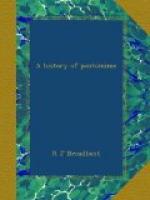Evil times, with the advent of the Commonwealth, soon fell upon our theatres, and when they, as well as plays, were suppressed by order of the Puritan Parliament, some of the actors followed the Royalist cause (we do not hear of any taking the side of the Parliament), and lost their lives fighting for the king. Others attempted to enact plays in secret, but these performances more often than not, caused the actors incarceration in some prison. At Holland House, in Kensington, many of these secret performances, by the aid of bribery, took place. To give timely warning of the performances Mr. Wright, in his “Historia Histronica,” mentions that “Alexander Goff, the woman-actor, was the jackal to give notice of time and place to the lovers of the drama.”
All this however, could not, and would not, keep the spirit of the drama alive. The theatres were, we know, totally suppressed, “so there might be no more plaies acted.” Play-goers there were, as I have shown, but they never knew when, in witnessing a performance, they might be seized by the military, to be fined or imprisoned, or perhaps both. A more lengthy reign of “Dramatic Terror” than what we had at this period, would, in all probability, have left us little or no trace of the Drama of this country. But a saviour was at hand, and that was Pantomime.
Pantomime, as previously stated, kept alive for ages, after the downfall of the Roman Empire, the Dramatic Art, and during the Commonwealth of this country, it practically did the same for us.
Owing to the exigences of the times, one Robert Cox, an actor of considerable genius, after the fashion of the Extemporal Comedies of Italy, invented a series of dramatic exhibitions at the Red Bull Theatre (where the first English actress made her appearance December 8, 1660) and elsewhere, under the guise of rope-dancing, a number of comic scenes from Shakespeare, Shirley, Marston, Beaumont, and Fletcher, and others. Cox’s exhibitions, known as “Humours” or “Drolleries,” were collected by Marsh, and reprinted (1672) by Francis Kirkman, the author and book-seller. This collection is entitled “The Wits, or Sport upon Sport, in select pieces of Drollery, digested into scenes by way of dialogue. Together with variety of Humours of several nations fitted for the pleasure and content of all persons, either in Court, City, Country, or Camp.”
Of these “Humours” Kirkman observes, “As meanly as you may now think of these Drolls, they were then acted by the best comedians; and, I may say, by some that then exceeded all now living; the incomparable Robert Cox, who was not only the principal actor, but also the contriver and author of most of these farces. How I have heard him cried up for his John Swabber, and Simpleton the Smith; in which he being to appear with a large piece of bread and butter, I have frequently known several of the female spectators and auditors to long for it; and once that well-known natural, Jack Adams of Clerkenwell, seeing




